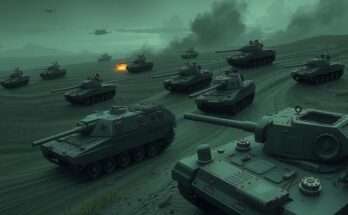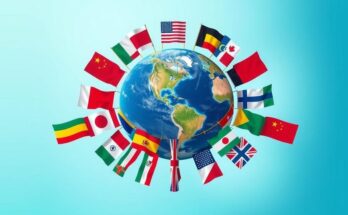The Democratic Republic of Congo is currently experiencing a worsening humanitarian crisis, with only 13% of those in need receiving aid prior to M23’s takeover of key regions. Regional diplomatic efforts, such as Angola’s mediation, have emerged, but skepticism surrounds their efficacy. The influence of current global politics complicates prospects for meaningful reform and stability in the DRC.
The Democratic Republic of Congo (DRC) is currently facing an escalating crisis, marked by deteriorating humanitarian conditions. As of January, prior to the M23 group’s takeover of Goma and Bukavu, merely 13 percent of the 11 million individuals requiring aid were receiving assistance. The International Rescue Committee has reported a significant decline in health services, with rising cholera cases as civilians struggle with severe sanitation issues.
The situation is exacerbated by regional decisions, such as the Southern African Development Community’s withdrawal of a stabilization mission intended to bolster the Congolese government. This move stemmed from a lack of desire among Southern African leaders to endure further losses for the clearly overwhelmed Congolese forces. Meanwhile, the Congolese government in Kinshasa appears increasingly chaotic, apprehensive about a potential coup, and dwindling in options.
Amid these challenges, Angola’s initiative to mediate direct talks between the DRC government and the M23 provided an initial path toward de-escalation. Congolese President Tshisekedi, initially resistant to the talks, seems to have been influenced by diminishing regional support and messages from U.S. Congressman Ronny Jackson. However, skepticism persists about the United States’ willingness to deepen military involvement in the DRC amidst concerns over instability.
Unfortunately, optimism for peace talks quickly diminished as the M23 withdrew its commitment to participate in discussions following European Union sanctions against Rwanda. Rwandan President Paul Kagame’s vigorous denunciation of these sanctions as “neo-colonial interference” has further complicated the dialogue, coupled with his decision to sever diplomatic ties with Belgium as a protest.
The most recent development involves a mediated summit between Kagame and Tshisekedi, where both leaders reaffirmed their intentions for a ceasefire. However, the efficacy of such rhetoric lacks credibility, given historical precedents of overlooked commitments. The absence of clear mechanisms for ceasefire enforcement generates skepticism regarding the sustainability of these accords.
By analyzing the influences of current global politics characterized by leaders like Vladimir Putin and Donald Trump, one can argue that humanitarian considerations are often disregarded while territorial ambitions resurface. This troubling context raises questions about the prospects for reform in the DRC’s governance or improvement in the plight of its citizens. The future remains uncertain, with little indication that existing frameworks or externally imposed solutions will lead to a substantive change.
The Democratic Republic of Congo’s situation is dire, facing a humanitarian crisis exacerbated by political instability and regional withdrawal of support. While efforts for dialogue have emerged, including mediated talks between the DRC and M23, optimism is undercut by historical failures and ongoing regional tensions. The broader implications of recent global political dynamics contribute to a complicated landscape, making the future of governance and humanitarian aid in the DRC particularly bleak.
Original Source: www.cfr.org




